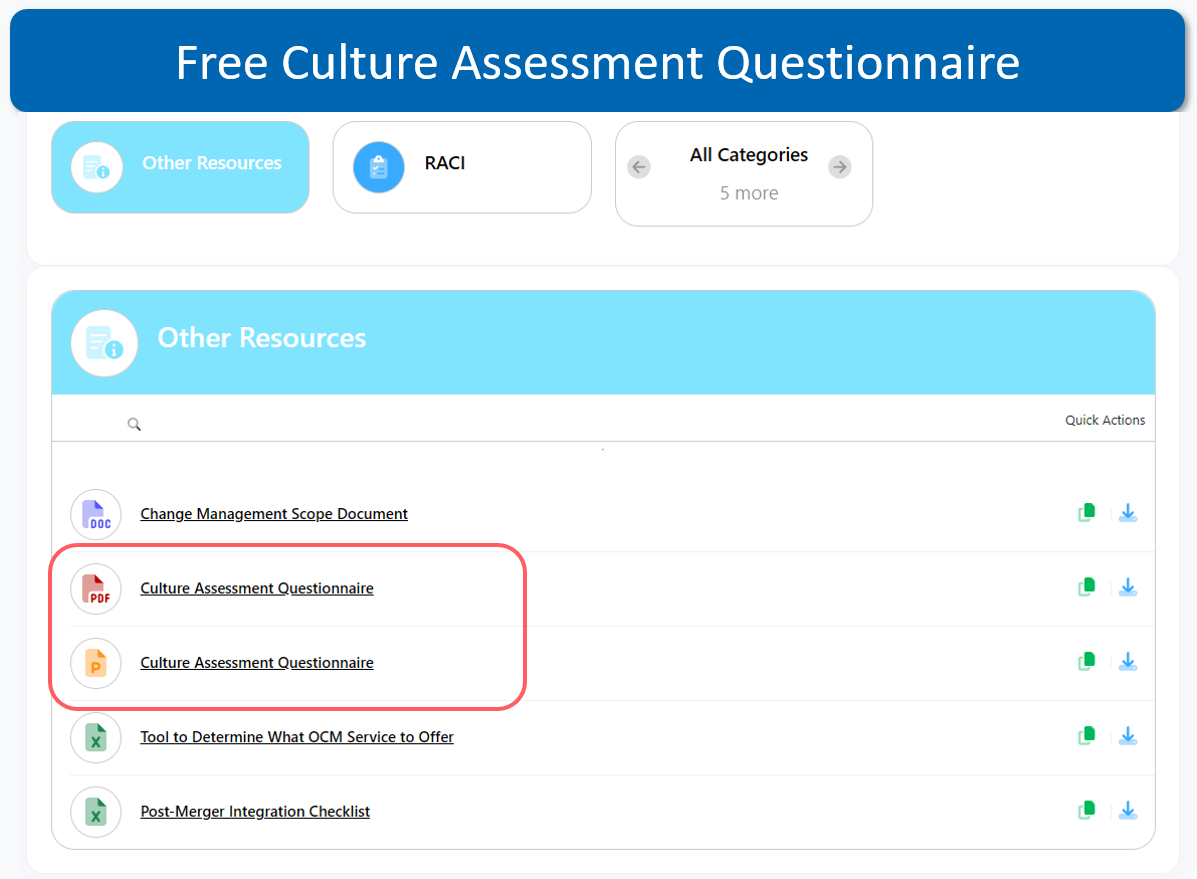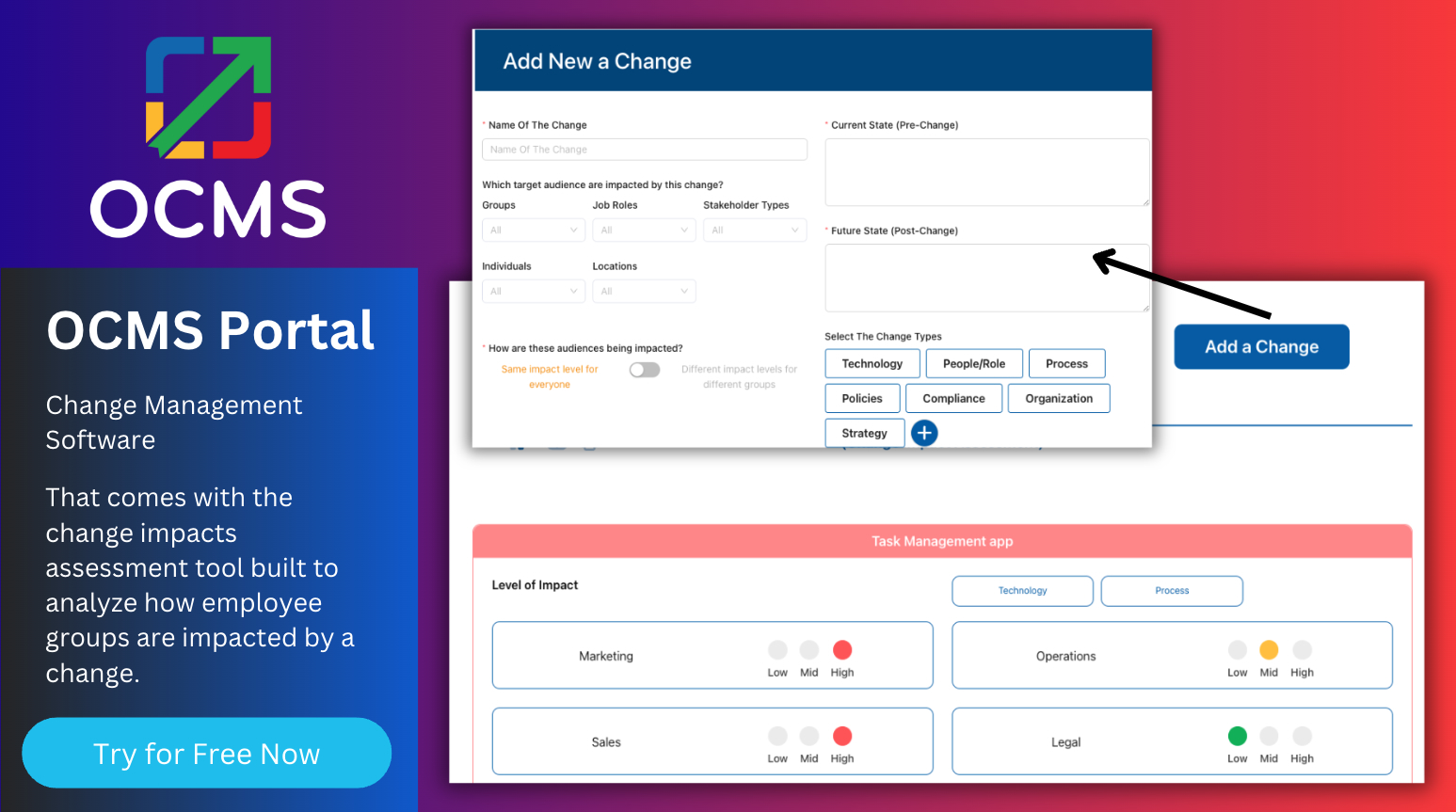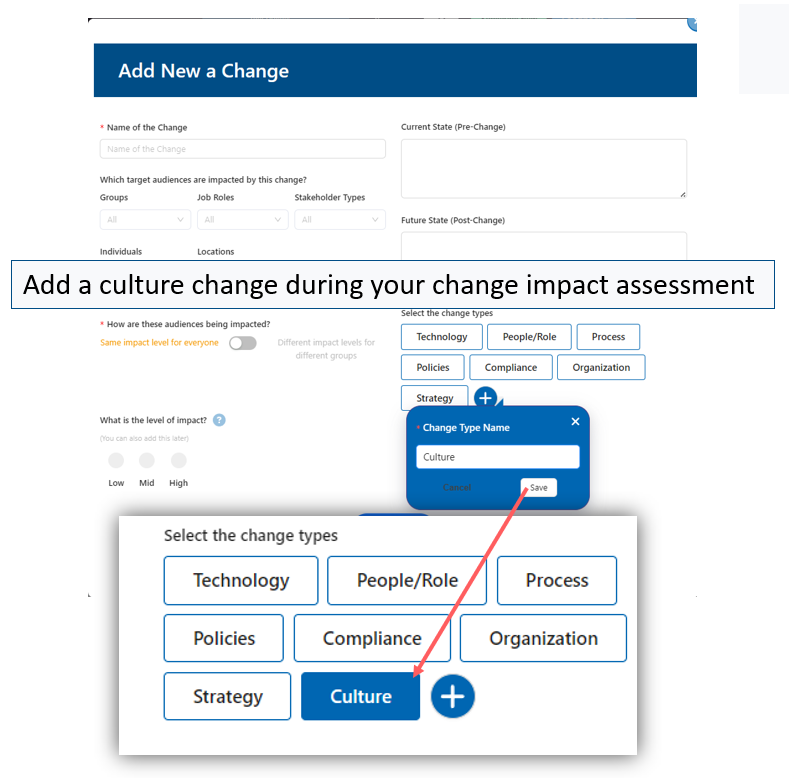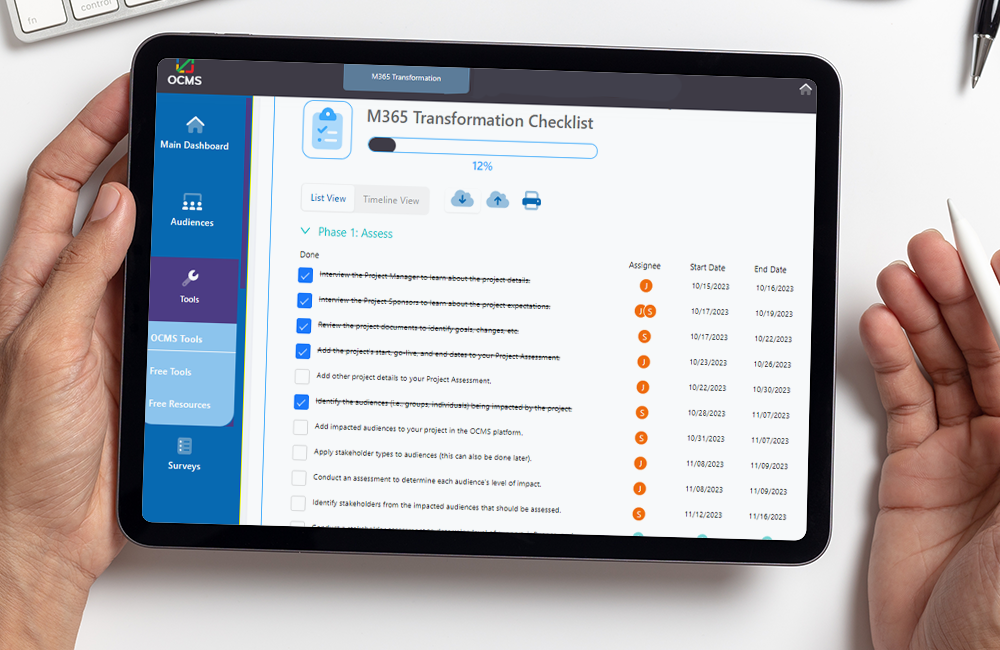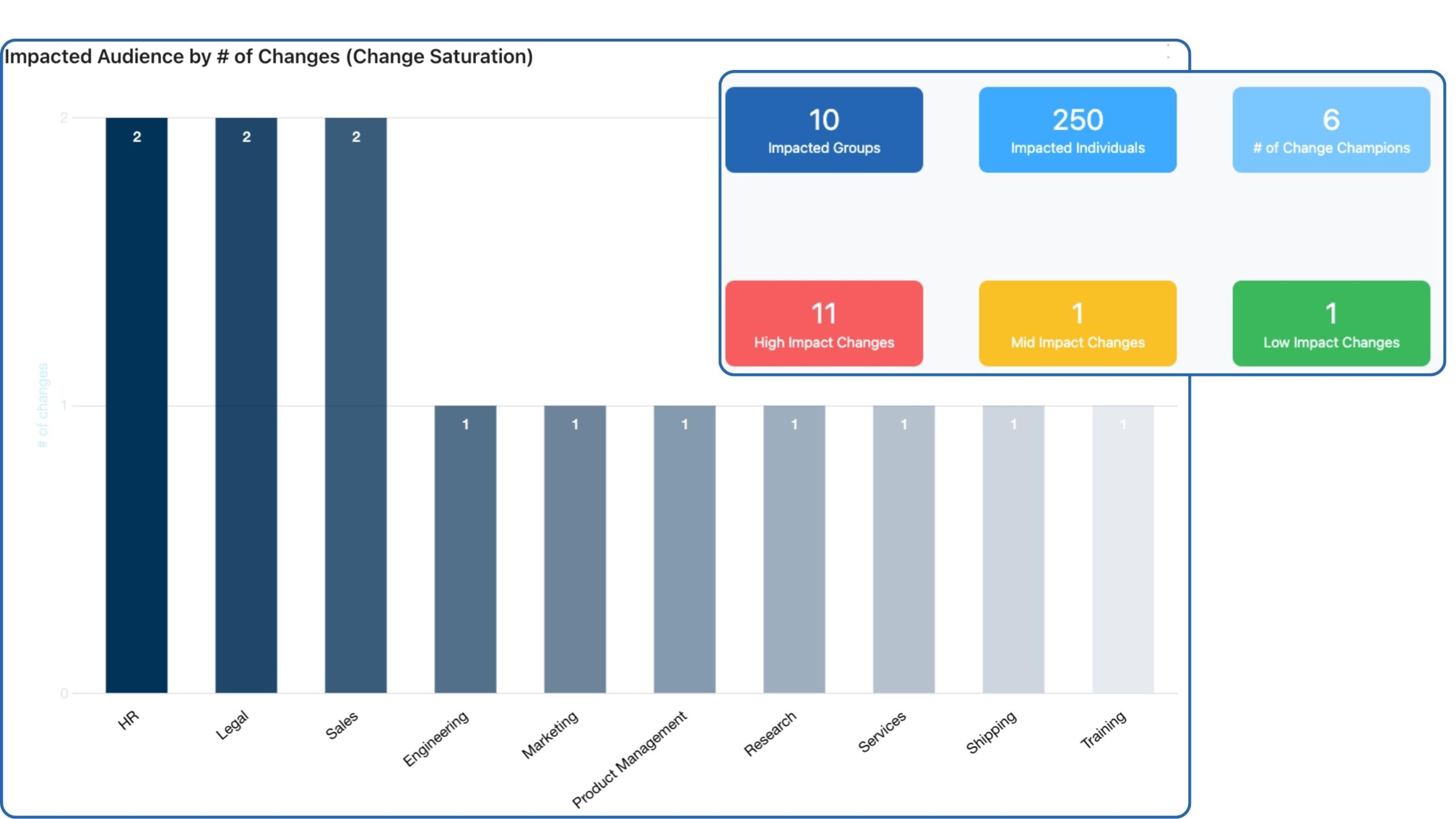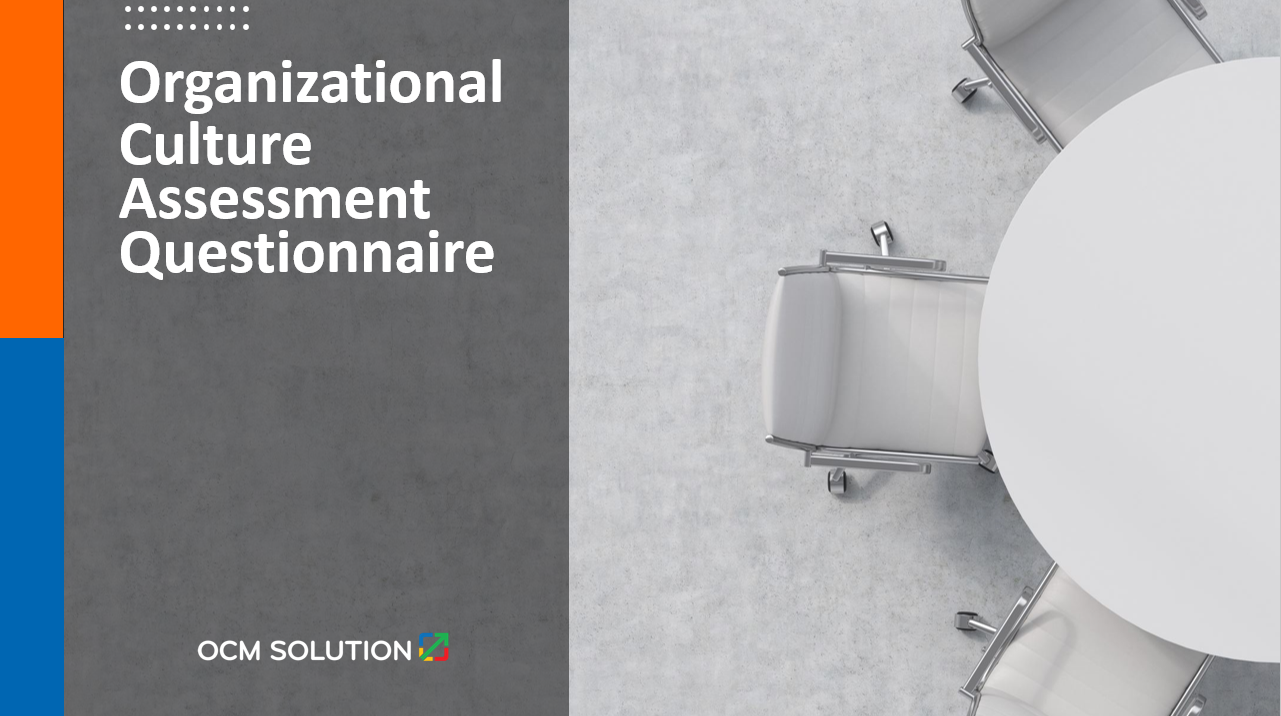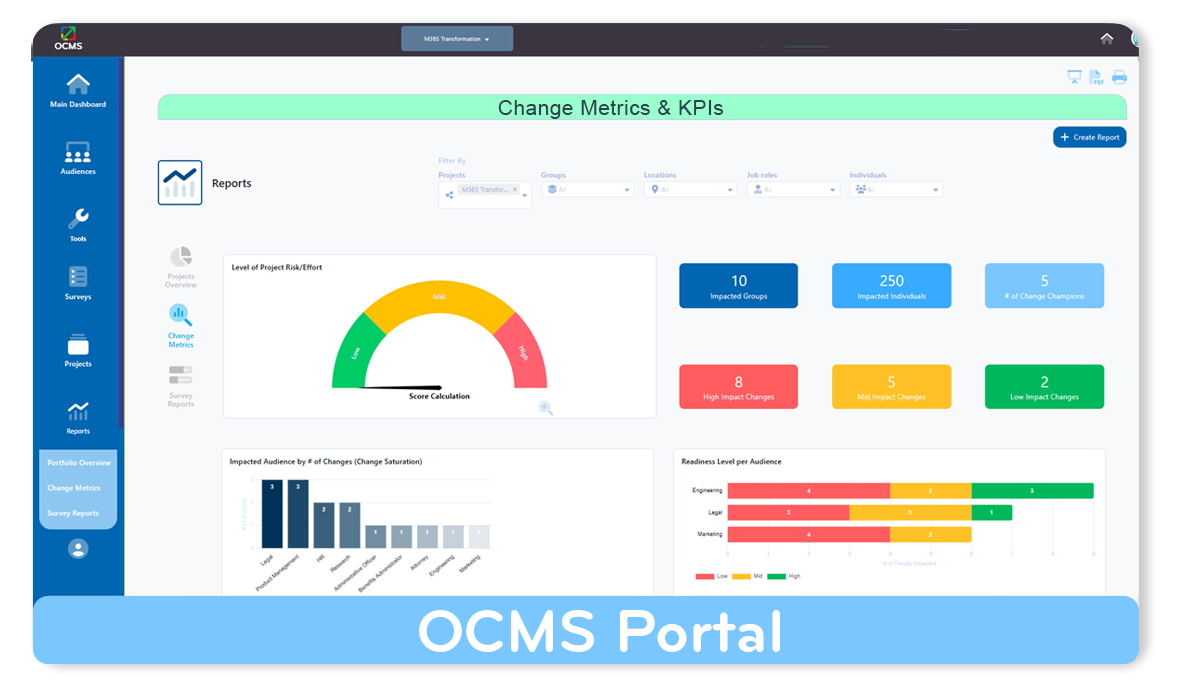Assessing Organizational Culture & Impacts on Culture from Company Transitions
Assessment of Organizational Culture
Organizational culture assessments are the insightful tools that unravel the unique blend of behaviors, values, and interactions shaping your organization. Before you can shape culture in a company, you need to understand the cultures and subcultures already in place, and a culture assessment is how you do that.

Wondering how it’s done? Well, it’s all about diving deep into the nuances of your company’s essence.
From engaging employees through surveys that capture their experiences and perceptions, to observing how teams collaborate and evaluating leadership styles – every interaction and policy is a piece of the puzzle.
We’ve got you covered with this guide and a free corporate culture survey, making it easier than ever to kick-start your cultural exploration.
Check out a quick topic summary below. If you want to dive into more, keep reading for a more detailed guide on assessing organizational culture.
Quick Summary
Culture Assessment Guide
Workplace culture refers to the collective values, goals, beliefs, priorities, and behaviors within an organization or its subgroups. Understanding this concept is crucial for assessing organizational culture. It involves grasping the shared values, goals, beliefs, priorities, and behaviors of the organization and its internal groups, guiding efforts to evaluate and enhance corporate culture effectively.
Organizational culture is reflected in its employees and leadership through:
- Behaviors
- Values
- Actions
- Policies
- Goals/priorities
- How they treat others, internally and externally
Understanding organizational culture is pivotal to a company’s functioning, fostering positive collaboration among teams and enhancing overall organizational well-being. However, poor culture poses significant risks, such as legal issues, difficulty in retaining talented employees, and missed business opportunities.
Why is Understanding Organization Culture Important?
Understanding organizational culture is crucial as it directly influences how teams, departments, and entire organizations operate and prioritize their activities.
Conducting a corporate culture assessment is vital to grasp the prevailing culture within different segments of the organization.
For instance, a department resistant to change and innovation might indicate a hierarchical or control culture, conflicting with the organization’s desired culture of innovation and flexibility.
Utilizing tools like a template of organizational culture survey questions helps identify existing sub-cultures and implement targeted changes according to the desired cultural transformation plan. The benefits of assessing organizational culture and clearly defining it for employees are multifaceted.
It reduces employee turnover by fostering a sense of belonging and shared purpose, enhances engagement by aligning behaviors with company priorities, mitigates incompatible leadership styles, and creates a stable environment with clearly defined expectations and priorities for all stakeholders.
Download a free organizational culture survey questionnaire in PDF or PPT when you sign up for a free tools account in the OCMS Portal. (PS: You’ll also gain access to over 100 other free tools and templates that you can use.)
Types of Organizational Culture
It’s important to understand the typical types of corporate cultures that you’ll run across when doing a corporate culture analysis.
Main Four Culture Types:
- Adhocracy / Creative Culture: Dynamic, creative, flexible, risk-taking, innovation-focused
- Clan / Collaborative Culture: Close-knit, collaborate on decisions, family-like, people-focused
- Hierarchy / Control Culture: Multiple management tiers, less flexible, stable, checks & balances, rules-focused
- Market / Competitive Culture: Competitive, gaining an edge, targets & deadlines driven, sales-focused
Additional Organizational Culture Types:
- Culture of Innovation: Change is welcome, pioneering, breaking boundaries, innovation-driven
- Customer-Centric Culture: Focus on customer experience, go above and beyond, customer service-driven
- Purpose-Driven Culture: The organization is rallied around a specific purpose or mission, clear priorities
- Safety-Driven Culture: Safety and security come first, can relate to occupational safety and/or cybersecurity
What are the Steps for Conducting a Culture Assessment?
When evaluating organizational culture, it’s crucial to adopt a comprehensive approach that encompasses various methods for a thorough analysis. Corporate culture assessment involves evaluating diverse aspects such as behaviors, values, actions, policies, goals, and interpersonal dynamics.
Here are key steps to assess organizational culture:
- Conduct Corporate Culture Surveys: Gather insights from employees through structured surveys to understand their perceptions and experiences.
- Analyze Stated Company Policies: Review official company policies and guidelines to evaluate the formal framework in place.
- Observe Interactions and Behaviors: Directly observe how teams interact, collaborate, and handle conflicts within the organization.
- Evaluate Leadership Styles: Assess leadership behaviors and styles to understand their impact on the organizational culture.
- Examine Employee Feedback and Suggestions: Consider feedback and suggestions from employees to identify areas of improvement and concerns.
- Review Organizational Goals and Priorities: Analyze the company’s mission, goals, and strategic priorities to assess alignment with the prevailing culture.
- Explore Cross-Departmental Collaboration: Evaluate how different departments collaborate and communicate to gauge the organization’s overall cohesion.
- Assess Diversity and Inclusion Initiatives: Examine efforts and policies related to diversity and inclusion to understand the organization’s commitment to fostering an inclusive culture.
Workplace Culture Assessment Summary Conclusion
Understanding and nurturing your organizational culture is not just a task; it’s a transformative journey that empowers your workplace, enhances collaboration, and fosters a sense of belonging among your employees.
By embracing the insights gained through culture assessments, you’re not only deciphering the present dynamics but also shaping a positive future for your organization. Remember, organizational culture isn’t static – it evolves and adapts. So, stay curious, keep listening to your team, and continue exploring the rich layers of your workplace culture.
Detailed Deep Dive
Complete Guide to Assessing Company Culture – Everything You Need to Know (Workplace Culture Definition & More)
This free guide provides you with everything you need to know about assessing organizational culture. It includes culture assessment tools, templates, and surveys that you can use for all aspects of your organization culture assessments.
If your organization or group is seeking to change its culture, this guide also provides you with the information you need.
Organizational culture is a key component of how any company operates. A positive culture leads to teams working together for the betterment of the organization. Poor organizational culture is a big risk factor that can lead to legal problems, difficulty keeping good employees, and lost business opportunities.
Free Downloadable Org Culture Assessment Questions | Survey
A culture assessment tool can help you identify the different cultures at play in a company. While company leadership may have conducted corporate culture training on their culture years ago, that doesn’t mean that since that time departments and business units haven’t gravitated to a different culture.
This can be the case, especially when there is no reinforcement of strong company culture.
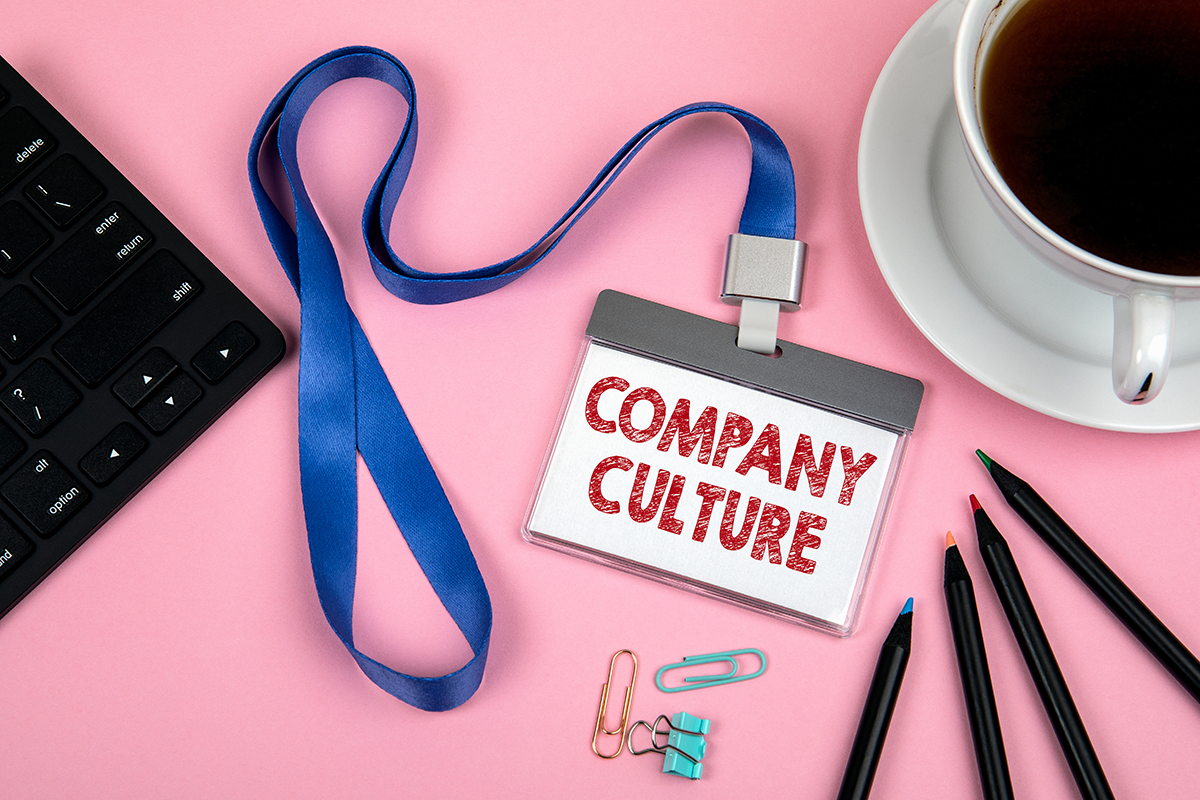
Organizational Culture Assessment Tool | Good Organisational Culture Assessment Instrument
Table of Contents
Keep on scrolling down this page to read each section or click any link below to go directly to that section.
1. Why You Really Need to Conduct Org Culture Assessment on a Regular Basis
2. Workplace Culture Definition
3. Why Is Understanding Organizational Culture Important?
4. What are the Standard Types of Organizational Culture in the Workplace?
5. How to Conduct Organizational Culture Analysis for Impacts from Changes (M&A, Transformations, etc.)
6. How To Assess Organizational Culture? Key Steps
7. Free Downloadable Organizational Culture Assessment Questions | Survey
8. Organizational Culture Survey Tool for Change Impacts Assessment
9. Organisational Culture Analysis FAQs
Do you need to assess the impacts of a culture change? Try the OCMS Portal with change impacts tool that you can use as a culture change plan template for assessing culture impacts. Start a free no-risk trial now.
Why You Really Need to Conduct Org Culture Assessment on a Regular Basis
It’s good to conduct an organizational culture assessment regularly (annually or bi-annually) to ensure a good organizational culture fit. There are also times when you’ll need an assessment of organizational culture to see if the culture will be impacted by a company initiative.
You would assess organizational culture impacts for major projects affecting the staff of an organization. This could include a merger, acquisition, divestiture, or another corporate initiative where culture would be changing for any impacted groups.
Without using an organizational culture assessment instrument (such as an employee survey), leadership can be in the dark about different cultures within the organization, which can lead to problems that hurt a company.
For example, you may assume that there is a good organisational culture (UK spelling) but get blindsided by customer service issues coming from a cutthroat culture that you did not realize existed in your sales department.
In this article, we’ll review the workplace culture definition for different types of organizational cultures. We will also discuss projects that require assessing the corporate culture for impacts, and organizational culture assessment tools for change impact, and to ensure a good organizational culture fit.
Keep reading to learn all about organizational culture framework, company culture assessment, how to identify good organisational culture, and to get a free downloadable organizational culture survey in PowerPoint & PDF.
Are you looking for a specific corporate culture assessment tool? Or do you have questions to assess company culture that you need answers to? Reach out anytime and we’ll be happy to help.
Workplace Culture Definition
Workplace culture is the shared values, goals, beliefs, priorities, and behaviors of an organization and/or groups inside the organization.
One of the first things you need to know when learning how to assess organizational culture is the workplace culture definition. What does “workplace culture” or “corporate culture training” mean? What makes a good organizational culture?
Assessing corporate culture is about learning the shared values, goals, beliefs, priorities, and behaviors of an organization and/or groups inside that organization.
Organizational Culture Survey Tool
Some organizations have a strong corporate culture and reinforce culture regularly in policies, actions, mission statements, and priorities. While other organizational cultures may form on their own, driven by a department manager or leader. Assessing the corporate culture of your organization is an essential step for driving change within the firm.
Corporate culture analysis is designed to uncover all cultures that may exist in a company, expected and unexpected.
Organizational culture is ultimately, the driving force for a company that is reflected in its employees and leadership through:
- Behaviors
- Values
- Actions
- Policies
- Goals/priorities
- How they treat others, internally and externally
Are you looking for corporate culture assessment tools or a corporate culture survey? Or do you have questions to assess company culture that you need answers to? Reach out anytime and we’ll be happy to help.
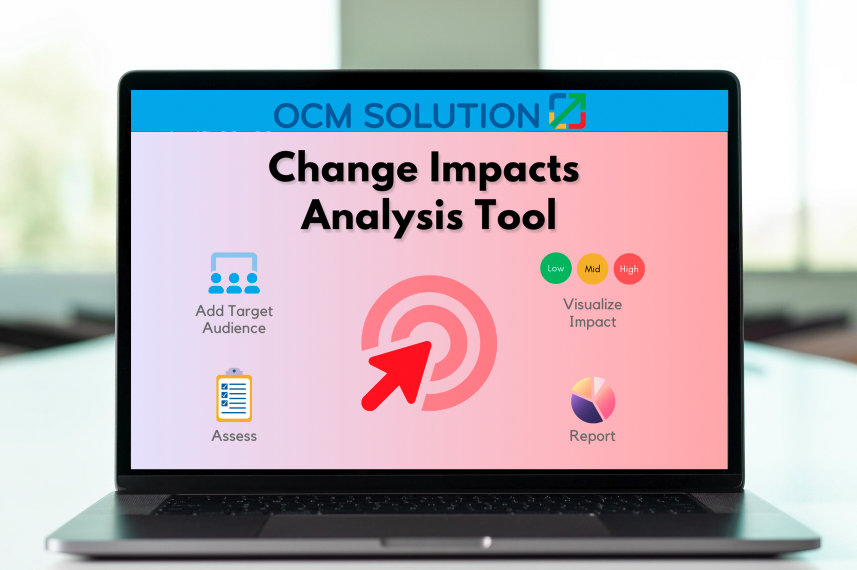
Use OCMS Portal’s Change Impact Culture Assessment Tool for effective management of culture change impacts.
Why Is Understanding Organizational Culture Important?
A corporate culture assessment is an important tool for understanding organizational culture. This is important because its ultimately the culture of a team, department, and/or organization that will dictate how the organization operates and what it prioritizes.
For example, a workplace culture assessment might find that a certain department that never seems to be able to innovate or update the technology tools it uses has a hierarchical or “control” culture. One where only a few leaders dictate how the group will operate and that is very resistant to adopting change.
This may be in contrast to a company’s desired culture of being innovative and embracing flexibility and transformation. This type of workplace culture definition could be either a “culture of innovation” or an “adhocracy culture.” (We’ll get into the standard types of organizational culture in the workplace in the next section.)
Organizational Culture Assessment Tool & Templates
You can’t align the employees and leaders in an organization around a single culture change plan and corporate culture unless you understand what sub-cultures may exist.
Using an organisational culture survey (UK spelling) or organizational culture survey questionnaire (US spelling) to identify and then change corporate culture, per your desired culture change plan, has many benefits.
Benefits of assessing organizational culture and defining culture for employees are:
- Reduces employee turnover because employees feel a sense of team/family and shared purpose.
- Improves engagement because employees understand the priorities of their company and can align behaviors accordingly.
- Mitigates overbearing leadership styles that do not align with the values and culture of the organization.
- Helps companies attract and retain top talent because they have a defined culture that employees feel proud to be a part of.
- Defines clarity of purpose and mission for the entire organization so everyone is pulling in the same direction.
- Promotes a positive brand image to customers and potential customers.
- Creates a stable environment where expectations and priorities are clearly defined.
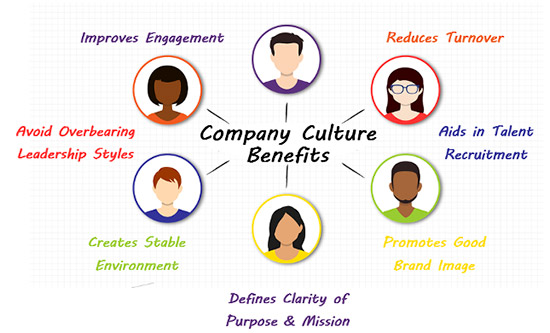

Are you looking for an organizational culture assessment instrument for change impacts or organizational culture survey questions? We can help!
Continue reading to access our free downloadable culture assessment survey questions. Check out the OCMS Portal with Change Impacts Assessment Tool to find a template for assessing organisational culture impacts from a change project.
What are the Standard Types of Organizational Culture in the Workplace?
When using a corporate culture assessment to assess for culture impacts, it’s helpful to have preset cultures as dropdown options that you can choose from. Otherwise having your team try to define their own description of culture during the organization culture assessment can become cumbersome and difficult.
There are four widely recognized organizational culture frameworks that we’ll describe below.
Each of these can go by two different names. For example, a company culture seen as dynamic, innovative, and flexible is the “Adhocracy” culture. This can also be called a “Creative” culture. A culture that is based on order with strictly defined organizational levels that is less flexible is a “Hierarchy” or “Control” culture.
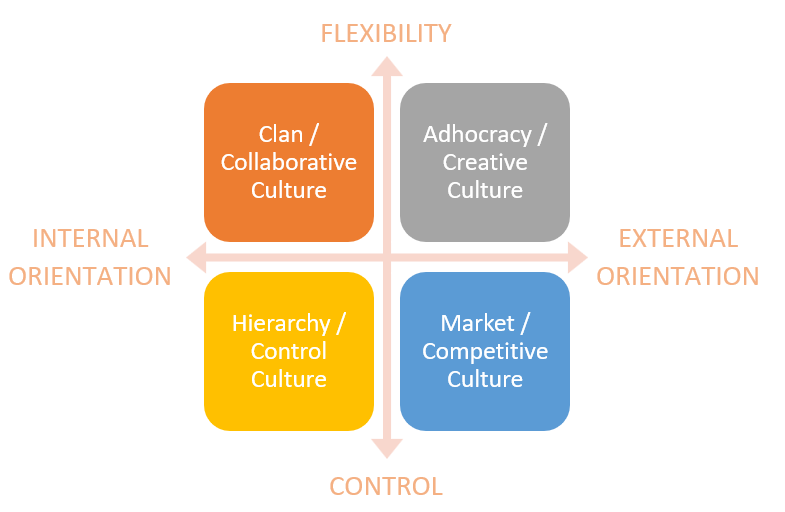
Other cultures may not exactly fit into those types, such as a safety culture or customer-centric culture.
Organizational Culture Analysis Tool
The OCMS Portal Change Impacts with Organizational Culture Assessment Tool for culture impacts gives you the flexibility to add your own culture change types.
Below is a description of the four main types of corporate culture as well as four alternate types of culture that may be applicable when understanding organizational culture during a change impact assessment.
Main Four Cultures:
- Adhocracy / Creative Culture: Dynamic, creative, flexible, risk-taking, innovation-focused
- Clan / Collaborative Culture: Close-knit, collaborate on decisions, family-like, people-focused
- Hierarchy / Control Culture: Multiple management tiers, less flexible, stable, checks & balances, rules-focused
- Market / Competitive Culture: Competitive, gaining an edge, targets & deadlines driven, sales-focused
Additional Organizational Culture Types:
- Culture of Innovation: Change is welcome, pioneering, breaking boundaries, innovation-driven
- Customer-Centric Culture: Focus on customer experience, go above and beyond, customer service-driven
- Purpose-Driven Culture: The organization is rallied around a specific purpose or mission, clear priorities
- Safety-Driven Culture: Safety and security come first, can relate to occupational safety and/or cybersecurity
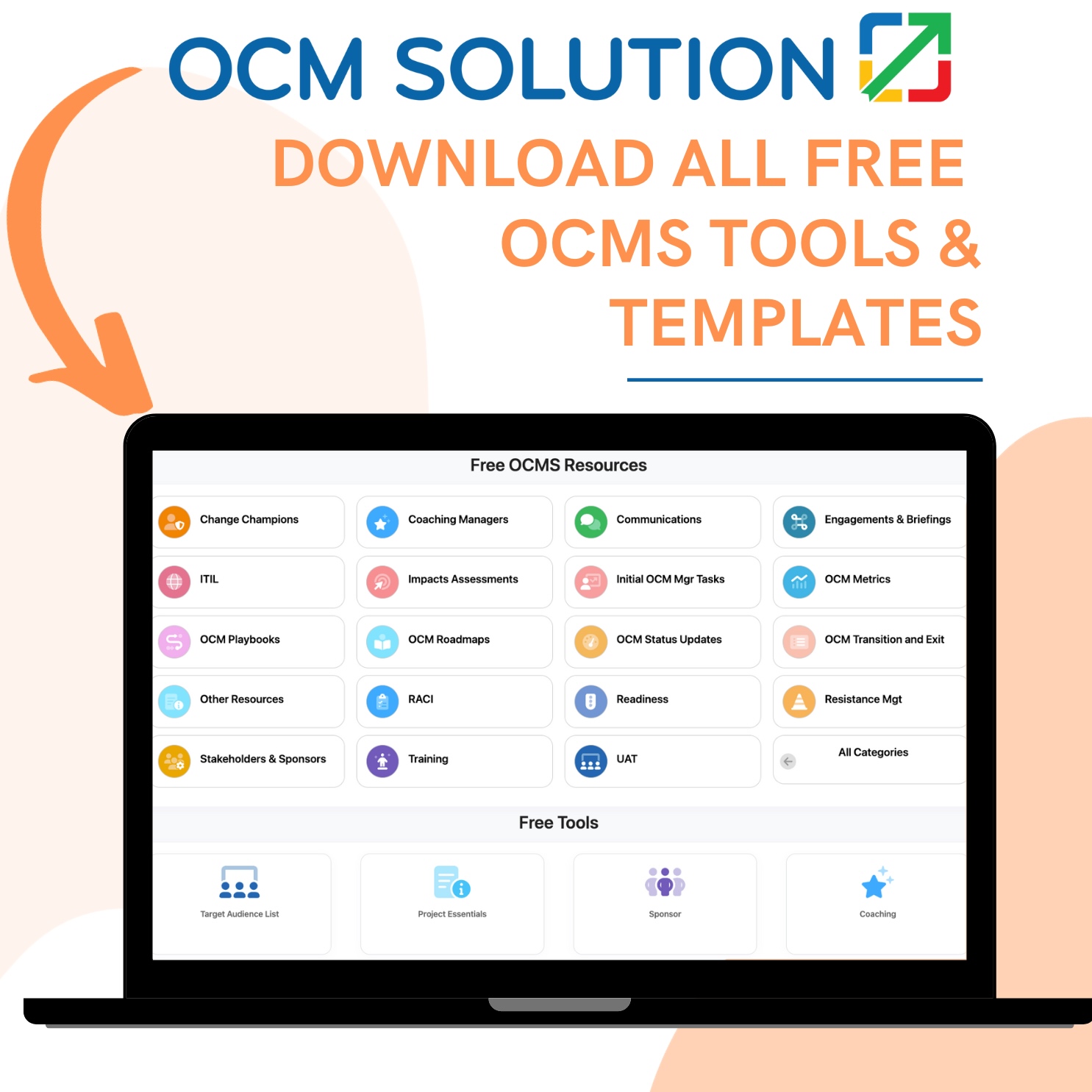
Gain instant access to over 100 corporate, project, and change management tools and downloads. This includes a free organizational culture assessment instrument. Click here to sign up for a free OCMS Portal account.
Do you have any questions or feedback about the company culture assessment tools outlined in this guide? Or do you have questions about assessing organisational culture? Please, contact us. We’ll love to hear from you.
How to Conduct Organizational Culture Analysis for Impacts from Changes (M&A, Transformations, etc.)
Certain projects undertaken by an organization will involve a change in corporate culture, either for the company as a whole or for individual teams or departments.
When a change impacts culture, meaning the culture will change, it’s important to do an organisational culture assessment (UK spelling) or assessment of organizational culture (US spelling) during the change impact assessment.
Types of projects that may involve needing a culture change plan template include mergers and acquisitions, organizational transformations, changes in purpose and mission, digital and technology initiatives, and more.
A change impact assessment is one of the most important parts of change management in a project. The purpose is to study the parameters of the project and identify WHAT is changing, WHO is being impacted by that change, and HOW.
Organizational Culture Survey Tool
In other words, which internal groups of employees/leadership and external groups (customers, partners, etc.) will need to change the way something is done as a result of the project.
For some projects, one of the impacts (things that are changing) will be organizational culture. In this case, organizational culture assessment tools (like the downloadable questions in this guide) should be used to assess the current culture of the various impacted groups.
It’s important to ask organizational culture assessment questions to determine the current culture a group has adopted, so you can best create a plan for corporate culture training on the new future desired culture.
Steps in a Change Impact Assessment with a Culture Change:
1. Learn about the project by meeting with the project team and studying project assets (project charter, roadmap, etc.)
2. Define the project methodology, software, and organizational culture survey tool you’ll be using.
3. Gather additional information on the project, such as the “As-is/To-be” process flows so you can identify who is impacted and how.
4. Assess the project and detail the types of impacts, the severity of impacts, and the groups being impacted. (It’s helpful to enter this into a change impact assessment tool like the one in OCMS Portal.)
5. Interview impacted department managers and other groups to determine any other impacts you may have missed and identify key information, such as the current group culture. This is when you’ll ask questions to assess company culture.
6. Socialize your findings with key leadership, project team members, sponsors, and other key stakeholders to get any additional input.
7. Finalize the change impact assessment and findings on the organizational culture framework.
8. Monitor for impacts as the project is progressing and update your assessment with any new information.
Get a checklist that walks you through several tasks in each of the phases above and the tools to do them. Sign up for a Free Trial of OCMS Portal for access to OCM Tools & Free Resources.
Do you have any questions about this article on organizational culture analysis (US) / organisational culture analysis (UK) or how to make an organizational culture assessment questionnaire? Reach out anytime and we’ll be happy to help.
How To Assess Organizational Culture? Key Steps
How should you assess the culture of an organization? A company culture assessment is best done using a multi-pronged approach that includes different methods for corporate culture analysis. Remember, corporate culture encompasses many things, including behaviors, values, actions, policies, goals/priorities, and how teams treat each other and those outside the group. So only conducting a corporate culture survey, or only looking at stated company policy is not going to be as informative or accurate as doing both of those things.
How to Assess Organizational Culture – Tools & Templates
Here are some of the methods you should employ when doing a workplace culture assessment:
- Observation of the group members and how they conduct themselves and interact with each other.
- Use of organizational culture survey questions to learn how each person describes their group’s culture (perceptions can differ).
- Interviews with leadership/group managers and supervisors.
- Review of the procedures and policies in place, which can often identify the group’s priorities (a component of the group’s culture).
- Interviews with other company groups that interact with the group you’re assessing to see how they view that group’s culture.
If you need help with an organisational culture assessment instrument (UK spelling) or organizational culture assessment instrument (US spelling), we have a free downloadable PPT and PDF for you in the next section.
This organizational culture survey questionnaire includes more than 30 organizational culture assessment questions that you can give to employees in a group.
How to Assess Organizational Culture – All-in-One Templates, Tools & Templates
If a project is impacting culture, then you’ll be assessing company culture as part of your change impact assessment. The section above provides you with an overview on how to assess the culture of a group or org. Do you have any questions or feedback about the company culture assessment tools outlined in this guide? Or have questions about creating a unique organisational culture survey? Please, contact us. We’ll love to hear from you.
Who is being impacted the most in a project?
The OCMS Portal with Change Impacts Assessment Tool makes it easy to wrap your head around what organizational culture is and what groups are being most impacted by different changes.
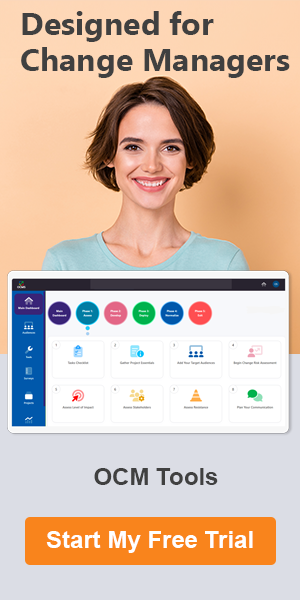
Please reach out if you have any questions about workplace culture definition or where to find organizational culture assessment instruments.
Free Downloadable Organizational Culture Assessment Questions | Survey
What types of questions do you ask impacted stakeholders when using a culture assessment tool for assessing organizational culture?
Here are a few examples from our free downloadable organization culture assessment survey:
- How is success rewarded in your group?
- How are mistakes handled?
- What are two things you would change about your daily work environment?
- What do you feel the organization’s mission is?
- True or False?: Teams have clearly defined goals that relate to the overall mission of the organization.
- True or False?: In our department, we’re agile and sometimes “play it by ear.”
These are just a few of the more than 30 questions for assessment of organizational culture in the PPT/PDF below.
(You’ll find it in the “Other” category on the Free Resources page)
Organizational Culture Survey Tool for Change Impacts Assessment
Are you are looking for an easy-to-use organizational culture assessment instrument to assess impacts on culture from a project? Then you’ll want to take a closer look at the OCMS Portal’s Change Impacts Assessment Tool.
This powerful cloud-based software with a template and change metrics reports dashboard allows you to assess multiple types of impacts, so you can plan change management accordingly. This helps you ensure employees of impacted groups are successfully adopting the new solutions.
You’ll find several free templates in the OCMS Portal as well, including one for doing an organization culture assessment.
Click below to learn more.
OCMS Portal with Organizational Change Impact Assessment Tool
Organisational Culture Analysis FAQs
Assessing company culture is about learning the shared values, goals, beliefs, priorities, and behaviors of an organization and/or groups inside that organization. Organizational culture is ultimately the driving force for a company that is reflected in its employees and leadership through:
There are four widely recognized organizational culture frameworks that we’ll describe below. Each of these can go by two different names. For example, a company culture seen as dynamic, innovative, and flexible is the “Adhocracy” culture. This can also be called a “Creative” culture. A culture that is based on order with strictly defined organizational levels that is less flexible is a “Hierarchy” or “Control” culture. Main Four Cultures:
There is no single organization culture framework that is best for all organizations. While a technology company might benefit from a creative culture of flexibility and innovation, a healthcare organization may require a control culture with plenty of checks and balances to ensure the quality of care. No matter what your organizational culture is, some common features of healthy corporate cultures include positive employee morale, employees feeling valued, an engaged workforce, and customers consistently having a good experience with the organization.
An organizational culture assessment questionnaire or organizational culture survey helps you identify the type of culture that an organization or business unit within an organization may have. It’s important to learn from the employees themselves how they see the culture within their specific team/department. It may differ from the culture of the organization as a whole or from what the leadership identifies as its corporate culture. External image sources:How do you define workplace culture?
• Behaviors
• Values
• Actions
• Policies
• Goals/priorities
• How they treat others, internally and externally What are examples of organizational culture in the workplace?
• Adhocracy / Creative Culture: Dynamic, creative, flexible, risk-taking, innovation-focused
• Clan / Collaborative Culture: Close-knit, collaborate on decisions, family-like, people-focused
• Hierarchy / Control Culture: Multiple management tiers, less flexible, stable, checks & balances, rules focused
• Market / Competitive Culture: Competitive, gaining an edge, targets & deadlines driven, sales-focused What are the best work cultures? (e.g., “good” organisational culture)
What is the purpose of an organizational culture assessment questionnaire?
Note: Content on OCM Solution's ocmsolution.com website is protected by copyright. Should you have any questions or comments regarding this OCM Solutions page, please reach out to Ogbe Airiodion (Change Management Lead) or the OCM Solutions Team today.


